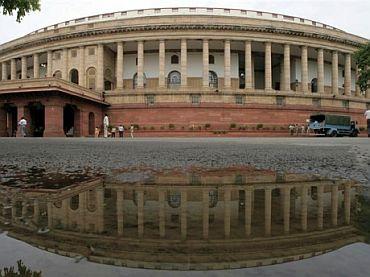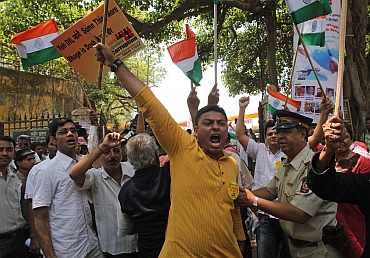The Right of Citizens for Time Bound Delivery of Goods and Services and Redressal of their Grievances Bill, 2011 was tabled in the Lok Sabha on Tuesday by V Narayanasamy, Minister of State for Personnel, Public Grievances and Pensions. The Bill is a step forward towards good governance. Here are its salient features:
What is the Citizen's Charter Bill?
The Right of Citizens for Time Bound Delivery of Goods and Services and Redressal of their Grievances Bill, 2011 lays down obligations of every public authority towards citizens, specifying delivery of goods and services in a time-bound manner and providing for a grievance redressal mechanism for non-compliance of citizens charter.
Publication of Citizens Charter
The Bill requires every public authority to publish, within six months of the commencement of the proposed legislation, a Citizens Charter specifying therein the category of goods supplied and services rendered by it, the time within which such goods shall be supplied or services be rendered the name and addresses of individuals responsible as designated officers for the delivery of goods or rendering of services information and facilitation centre
It requires every public authority to establish information and facilitation centre for efficient and effective delivery of services and redressal of grievances.
...
All you need to know about the Citizen's Charter Bill
Grievance redress officer
It requires every public authority to designate grievance redress officers in all public authorities of the central, state, district and sub-district levels, municipalities, panchayats etc. to enquire into and redress any complaints from citizens in a timeframe not exceeding 30 days from the date of receipt of the complaint.
Designated authority
The Bill provides that any individual aggrieved by a decision of the concerned grievance redress officer may, within 30 days, prefer an appeal to the designated authority who shall dispose of such appeal within 30 days from the date of receipt of such appeal. The designated authority shall be from outside the concerned public authority.
State/central public grievance redressal commission
The Bill provides for constitution of the state public grievance redressal commission and the central public grievance redressal commission consisting of chief commissioners and other dommissioners.
It also provides that any person aggrieved by the decision of the designated authority falling under the jurisdiction of the state government may prefer an appeal to the state public grievance redressal commission and any person aggrieved by the decision of the designated authority falling under the jurisdiction of the central government may prefer an appeal to the central public grievance redressal commission.
All you need to know about the Citizen's Charter Bill
Image: Anti-graft crusader Anna Hazare though he wants the Citizen's Charter Bill as as part of the Lokpal BillPenalty and compensation
It confers power upon the designated authority, the state public grievance redressal commission and the central public grievance redressal commission to impose a lump-sum penalty, including compensation to the complainant, against designated official responsible for delivery of goods and services or grievance redress officer for their failure to deliver goods or render services to which the applicant is entitled, which may extend up to Rs 50,000 which shall be recovered from the salary of the official against whom penalty has been imposed.
It also provides that on the imposition of the penalty, the appellate authority may, by order, direct that such portion of the penalty imposed under the proposed legislation shall be awarded to the appellant, as compensation, not exceeding the amount of penalty imposed, as it may deem fit.
Disciplinary action against erring officials
The Bill provides that if any public servant is found guilty of offence, the disciplinary authority shall initiate disciplinary proceedings against such officer of the public authority, who if proved to be guilty of a mala fide action in respect of any provision of this Act, shall be liable to such punishment including a penalty as the disciplinary authority may decide.
All you need to know about the Citizen's Charter Bill
Image: An anti-corruption rally in New DelhiPhotographs: Reuters
Action against corrupt practices
It provides that where it appears to the designated authority or the state public grievance redressal xommission or the central public grievance redressal commission that the grievance complained of is prima facie indicative of a corrupt act or practice in terms of the Prevention of Corruption Act 1988, on the part of the responsible officer of the public authority complained against then it shall record such evidence as may be found in support of such conclusion and shall refer the same to the appropriate authorities competent to take cognizance of such corrupt practice.
Appeal to Lokpal/Lokayukta
According to the Bill, any person aggrieved by the decision of the central public grievance redressal commission or the state public grievance redressal commission, which contains the findings relating to corruption under Prevention of Corruption Act, 1988, may prefer an appeal to the Lokpal or Lokayukta, constituted under the Lokpal and Lokayukta Act, 2011.





article